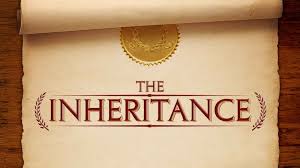In Him also we have obtained an inheritance, being predestined according to the purpose of Him who works all things according to the counsel of His will, that we who first trusted in Christ should be to the praise of His glory. In Him you also trusted, after you heard the word of truth, the gospel of your salvation.
Ephesians 1:11-13a (NKJ)
Where’s the Money?
At the death of famous celebrities, there always seems to be some uproar with reference to inheritance. Emotions overflow into the media as children and siblings fight over monies they feel are rightfully theirs.
Family members are often excluded—fairly or unfairly—while others are left huge sums of monies for the rest of their life. And if they don’t spend it up, then they too will leave an inheritance for those left behind. This week we will discuss another spiritual blessing afforded us who are in Christ—an irrevocable inheritance.
What is the Inheritance?
Legal inheritance refers to actual property or goods received after a family member’s death. While Jewish inheritance customs were linked to family blood lines, Greek and Roman laws also provided for the disposition of family possessions through the adoption of an heir.
The Scriptures transform the concept of inheritance to include the acquisition of spiritual blessings and promises from God. As part of the plan of salvation, God predestined those in Christ to adoption as sons (Eph. 1:5).
This inheritance was part of the plan of salvation designed at the foundation of the world (Eph. 1:4). It was all part of God’s predestined purpose. A plan written without input from man but according to God’s “perfect will”.
Believer’s inheritance is the possession of salvation; more specifically, the experience of joyful existence with God.
Who are the heirs?
- Christ. Jesus Christ is heir in a very unique way because of His eternal relationship with the Father. God has placed all things under His only begotten Son’s feet and given Him all power to both judge and rule (Heb. 1:2b-3), including the future Millennial kingdom.
- The Jews. The nation of Israel also has a special relationship with God as a result of His promises to Abraham. Through these Old Testament promises, the Jews “first trusted” (Ep. 1:12). They were to be “living testimonies” to the goodness and faithfulness of God . But like Abraham, they too would need to receive their inheritance by faith (Rom. 4:1-3).
- Believers. The Gentiles “also trusted” based on their belief after hearing “the word of truth—the gospel of salvation”. As the word of faith is preached, access to God’s inheritance is found by mply in confession and belief (Rom. 10:8-13). As both heirs and joint heirs with Christ, we receive the same things that Christ receives (Rom. 8:17).
An inheritance shared.
In Christ, the collective “we” (Eph. 1:11), stand justified at the foot of the Cross (Rom. 5:1-2) “having obtained” (note this is past tense) our inheritance of salvation.
Concurrently, we “trust” in Christ and receive salvation that delivers us from the penalty and power of sin until the awaited “redemption of the purchased possession” in eternity. Then believers will be delivered from the presence of sin (1 John 3:2; Rev. 21:4).
Thank God, our heavenly Father has given us an inexhaustible and “incorruptible inheritance reserved in heaven” (1 Pet. 1:4). We do not have to argue over whether we are the “rightful heirs” of this inheritance. It is a spiritual blessing given to us by the glorious grace of God through faith in Jesus Christ (Col. 3:24). There is no need to wait until there is a death to receive it, for it is available now to those who believe. It is an irrevocable inheritance to each of us who are in Christ.

